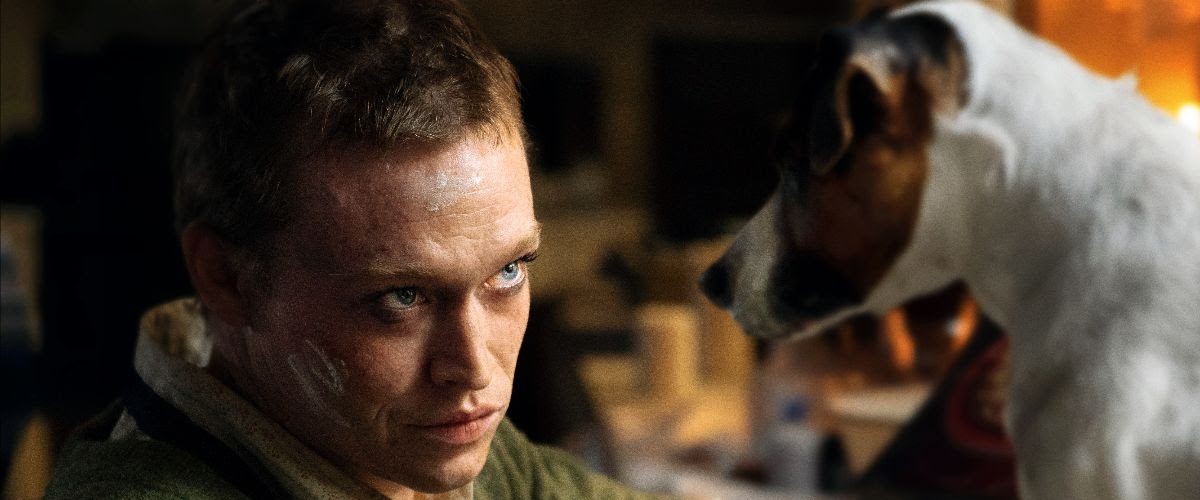It can be fun to watch a gifted character chew scenery, especially when the performer has a good script and/or supportive collaborators. Caleb Landry Jones has neither in “Dogman,” a sweaty, listless crime drama about a handicapped dog shelter owner who’s also an amateur drag performer. Jones (“Nitram,” “Get Out”) plays Doug, a canine-loving misfit whose twitchy personality and flamboyant behavior only seems ideally suited to the gifted actor. Jones pouts and murmurs at sub-decibel levels throughout and leans so hard into writer/director Luc Besson’s tin-eared dialogue and chintzy image-making that it soon becomes impossible to enjoy watching him bluster his way through a rare lead role.
Besson (“The Fifth Element”) often encourages Jones to take big swings in his performance as Doug, a soft-spoken showboat who’s constantly tested and underestimated by a litany of cosmic injustices. Doug’s a sullen martyr with a mood board of singularly endearing underdog qualities—in addition to saving pooches, Doug also loves cosplaying as Edith Piaf—that Besson and Jones never pull together into a compelling character study.
In his smaller roles, Jones tends to get by on his waxey, hard looks, which suggest a coy, mercurial presence who acts out with alarming regularity. Jones always looks sickly and threatening, all roving eyes and watery scowls. So you can easily imagine why he was cast as Doug, who gets arrested in an early scene while wearing a tacky pink dress, with matching forearm-length gloves, and then spends most of the movie recalling his sordid backstory to the sympathetic, but under-developed police psychiatrist Dr. Evelyn Decker (Jojo T. Gibbs).
Jones braces himself with an unfortunate Blanche DuBois southern accent and a preening hard stare throughout Doug’s meandering conversations with Evelyn. Neither of these stock gestures becomes more endearing with over-use, especially given how unconvincing Besson’s dialogue tends to be, and how over-edited most of Doug and Evelyn’s dialogue scenes are, too.
Evelyn usually sets Doug up for more self-pitying observations about his sad life. Some choppy flashbacks confirm how unlovable and neglectful the world can be, even for a proud survivor like Doug. He will eventually strut out of his wheelchair, with some over-emphasized difficulty, and drape himself across a silhouette of Christ’s cross. “I am standing—for you!” Doug yells while “Non, Je Ne Regrette Rien” blares on the soundtrack.
Campy and joyless, Doug’s story isn’t even fun when it takes detours into the cabaret night club world of drag. There’s so much flat, uninflected build-up to these scenes, too, and no cliché seems to have been left out of Doug’s exhausting account of why he’s such a quirky-sad anomaly. In Jones-less flashbacks, we see a young Doug (Lincoln Powell) thrown into a dog kennel and then antagonized by his sanctimonious older brother Richie (Alexander Settineri), who wears a big cross around his neck, and his cartoonishly overbearing father Mike (Clemens Schick), another violent pseudo-Christian. These dismal establishing scenes mainly reflect Besson’s knowledge of hoary pulp fiction clichés. Sometimes cute, well-trained dogs show up and do some tricks. They also deserve better material.
There’s more realism, but less life-like detail in skimpy cut-away scenes set during the movie’s present day, also featuring dogs as well as some lame human antagonists for Doug. There’s some cops and other blue collar government functionaries, who threaten to shut down Doug’s grungy, but independently owned dog shelter. Then there’s the nosy and instantly infatuated insurance claims adjuster Ackerman (Christopher Denham), who mainly gives Doug more opportunities to scoff about how lonely he gets without human companionship. There’s also a stereotypical Mexican gangbanger named El Verdugo (John Carlos Aguilar) who harasses one of Doug’s neighbors—never on camera or discussed beyond an early scene—and then eventually gets into some canned beef with Doug. None of these sub-plots tells you anything about Doug that Jones’s exhausting performance doesn’t already.
Casting Jones as Doug might have ironically been the biggest misstep in making “Dogman” given Besson’s indifferent direction and sketchy scenario. Jones needs slower-paced scenes and more generous dialogue to match his twitchy, actorly tics. He never lets you forget that he’s acting, and it makes even the raspiest murmur sound like a megaphone-enhanced stage whisper. You can see the worst of his character and performance during Doug’s drag scenes, like when he emphatically lip-syncs along to a recording of Piaf singing “La Foule.” Doug’s wig is presumably meant to look bad, but it still looks more like the MC5 than La Môme.
Jones’s campy performance is even harder to take seriously, not just because of his stock gestures, but his audience’s thunderstuck response. Then again, it’s not hard to see that Jones isn’t the only one responsible for his disappointing performance. Besson’s extra-schlocky sensibilities seem ideally suited to his star, but he never gives Jones anything worth showing off.




















